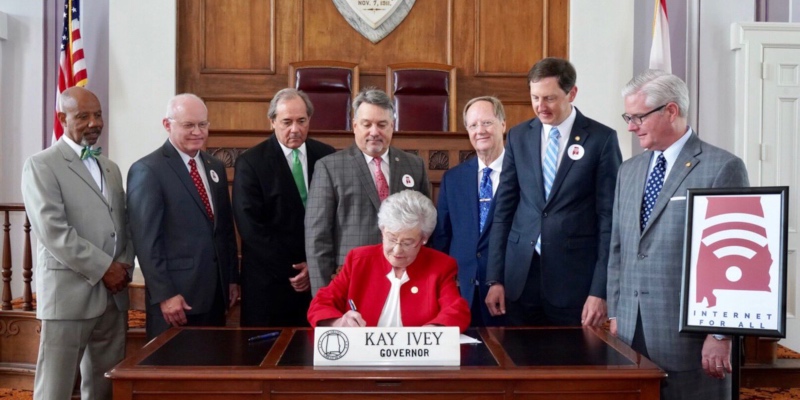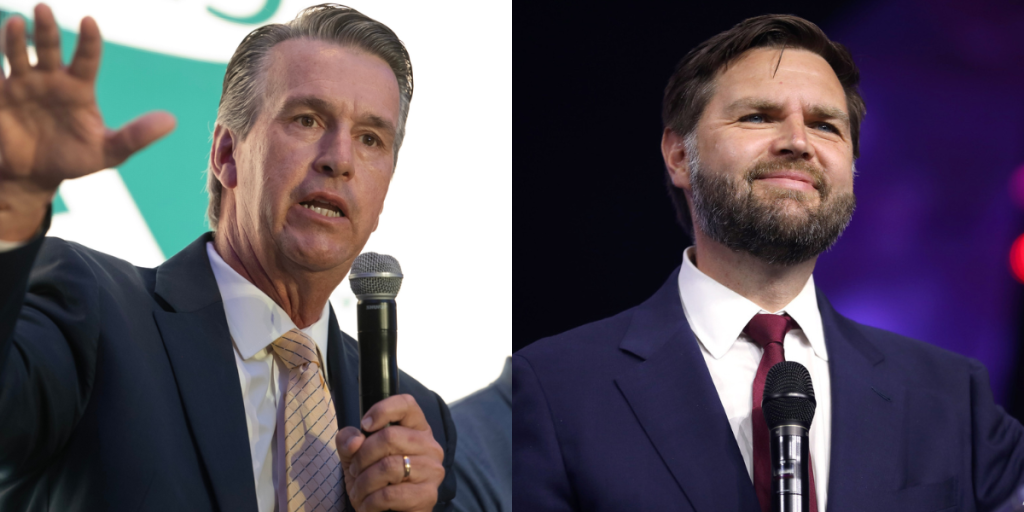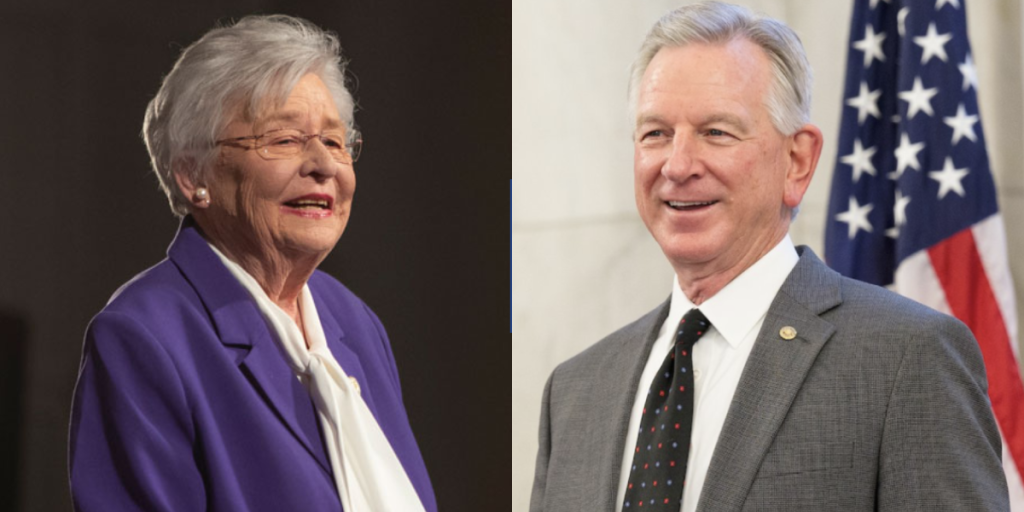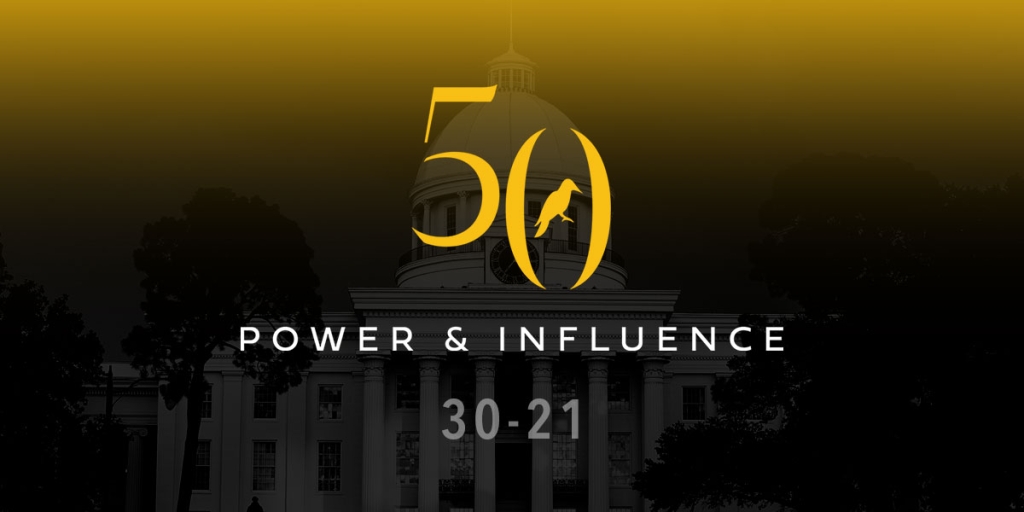MONTGOMERY — Alabama took an important step forward towards “modernizing” the state on Thursday.
In a packed ceremony inside the Old House Chamber at the State Capitol, Governor Kay Ivey signed two major broadband bills into law: HB 400 by State Rep. Randall Shedd (R-Fairview) and SB 90 by State Sen. Clay Scofield (R-Guntersville).
Before applying pen to paper, Ivey spoke to members of the media and a sizable crowd from the Alabama Rural Broadband Coalition. She said the Yellowhammer State needs to do more to expand high-speed, affordable broadband access, as modern internet capability is crucial to the economy, education, healthcare and quality of life in Alabama.
Last year, Scofield’s Alabama Broadband Accessibility Act created a grant program that really got the ball rolling on improved broadband in the state. Now, the two bills signed on Thursday are expected to keep that momentum moving in the right direction.
“These bills will open a whole new world to so many of our citizens who have been left behind on the information superhighway,” Ivey said. “I congratulate our Legislature for coming together to help make providing broadband internet access easier and more efficient. I look forward to seeing the great strides that our rural citizens will take now that they have the same opportunity as those who live in larger cities.”
HB 400, the Broadband Using Electric Easements Accessibility Act, will allow electricity providers to use or allow the use of existing or future electric easements for broadband purposes.
SB 90 updates and expands Scofield’s Alabama Broadband Accessibility Fund, increasing the minimum service threshold and amending the amount of grants that can be awarded for specific broadband projects.
Scofield advised, “Just as years ago, co-ops and private companies invested in bringing electricity to rural areas across the country to improve quality of life and create jobs for millions, this legislation will continue to expand access to high-speed internet to those same households and businesses, creating new jobs and opportunities in the process.”
Today is an important step forward in modernizing Alabama. I’m proud to sign HB400 & SB90 which will bring high-speed internet access to all areas of AL. This is a major win for rural AL, & I commend the bipartisan efforts of the Legislature to make this possible. #ServingAL pic.twitter.com/0Q6JwMoQ2h
— Governor Kay Ivey (@GovernorKayIvey) May 30, 2019
The press conference occurred as the House and Senate were both in session, so not all of the staunch proponents in the legislature were able to attend. However, Scofield and Shedd were able to join the governor, along with broadband stalwarts like Senate Majority Leader Greg Reed (R-Jasper), House Majority Leader Nathaniel Ledbetter (R-Rainsville), Black Caucus Chair A.J. McCampbell (D-Livingston), State Sen. Steve Livingston (R-Scottsboro) and State Rep. David Standridge (R-Hayden).
Senate President Pro Tem Del Marsh (R-Anniston) and Speaker Mac McCutcheon (R-Monrovia) also released statements celebrating the bills being signed into law.
“I am thrilled that Gov. Ivey has signed these bills that will be so helpful to our rural constituents,” Marsh said. “More than 840,000 Alabamians have not had access to broadband and therefore have lacked total, fair access to our worldwide economy. I hope to see movement on getting as many people connected as soon as possible.”
McCutcheon called the signing of the bills the beginning of a new day for Alabama jobs.
“Small businesses all across the state can now expect a fair shot at the global economy,” the speaker remarked. “It is an exciting time for the education community, entrepreneurs, for rural health workers and patients who will have access to advances in telemedicine and for our farmers who will benefit immensely from broadband.”
Lt. Governor Will Ainsworth has also been a vocal supporter of improved broadband services in the state throughout his time in public service.
“As someone who once represented a largely rural House district, I know that access to high speed broadband dramatically affects issues like economic development, public school performance, and simple quality of life for residents,” Ainsworth told Yellowhammer News.
“The state must keep and maintain its commitment to rural broadband expansion so that all of our citizens, regardless of where they live, can take part in Alabama’s unprecedented economic boom,” he concluded.
The World Bank commissioned a study in 2014 that showed just a 10% increase in broadband penetration could increase economic growth by 1.2%. That study also concluded that doubling broadband speeds can add 0.3% to GDP growth.
As of late 2018, it was estimated that 800,000 people in Alabama are without access to a wired connection capable of 25mbps download speeds and that 276,000 people in the state still do not have any wired internet providers available at all.
Specifically on SB 90, Reed commented, “This is a critical piece of infrastructure legislation. When people think about infrastructure, it’s traditionally just roads and bridges, but in a digital age that relies heavily on cutting edge technology, investing in expanding and improving broadband is equally as important.”
“This bill sets up rural Alabama for further growth and prosperity, and I thank Senator Scofield for spearheading this important work,” he added.
Sean Ross is a staff writer for Yellowhammer News. You can follow him on Twitter @sean_yhn













